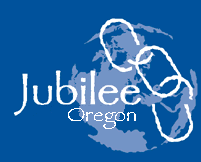
For the last several months of Winter Term at PSU, we, a group of college seniors, have participated in a Senior Capstone course, International Debt Relief taught by Dr. Patricia Rumer. Our curriculum has taught us about a number of interrelated topics, such as the Millennium Development Goals, The Jubilee Act, PEPFAR, the ONE Campaign, and the issues they address such as HIV/AIDS, global poverty, and the cancellation of illegitimate debt. We worked in three groups to study the Millennium Development Goals and with community partners to create an educational/advocacy community event.
The goals 6 and 8 of the MDGs focused a public event on campus featuring film and educational speakers, Debt & AIDS: an International Perspective. The event took place on February 26, 208 at the PSU Native American Center. For many of us, this was our first attempt at creating a community event. We were extremely pleased to have Argentine Nobel Peace Prize Laureate Adolfo Perez Esquivel speak at our event. We were also grateful to have Beverly Keene, a colleague of Sr. Esquivel, who translated for him and contributed her own insights as Jubilee South coordinator. Our third speaker was Vice Provost Sean C. Smallman of PSU, who has independently conducted his own extensive research on HIV/AIDS in South America. After the presentations we had a lively Q&A session with all three speakers.
The other main component of our event was two short films, one of which was directed and produced this term by our very own classmate, Carrie Stiles. Entitled, The Haiti Resolution: A Call to Action, it effectively covers the context and history of Haiti’s odious debt, and the current legislation being pushed for its relief. The 10-minute film features footage of Desmond Tutu, Wangari Matthai, and interviews with Nancy Yuill and Beth Poteet, co-chairs, Jubilee Oregon, our community partners for the Goal 8 group. The final cut of the film will be used by Jubilee Oregon as a promotional tool, and will be posted on You Tube for further exposure.
The other film showed at our event was “Our Brother’s Keepers,” directed by Katherine Mullins. It is a documentary set in Lusaka, Zambia that gives a perspective of the AIDS crisis in Africa. The film reveals some of the social implications of debt and AIDS in Zambia. Hundreds of thousands of Zambian children have been orphaned by AIDS and this film follows two families in their fight to provide for their siblings and just survive. Throughout the film there were clips of a speech made by Stephen Lewis, former UN Special Envoy for HIV/AIDS in Africa, who demonstrated the “bigger picture” of the causes and implications of debt on poor countries, like AIDS orphans. Stephen Lewis will be in Portland to speak on May 9th, World AIDS Orphans Day. If you are interested in hearing him speak, look for the details on Jubilee Oregon’s website, www.jubileeoregon.org.
ADVOCACY:
During our 10-minute break and at the conclusion of the event, our audience was able to converse with our speakers, learn more about Debt and Aids from our community partners who were tabling in the back, and most importantly, take action by sending an email or signing postcards to our congressional representatives in Oregon and Southwest
(photo from Julia Cortez, El Hispanic News, Portland, OR)


